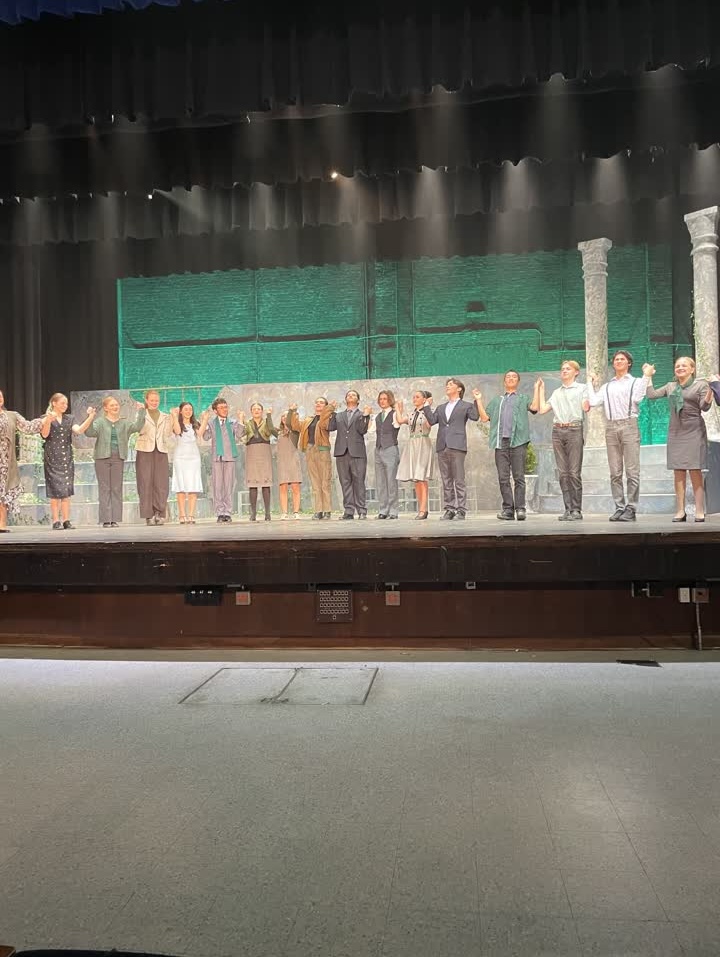War…family drama…misogyny…hubris…tragedy. The WHS Theatre Department performed a modern adaptation of the Greek classic Antigone which was written in 440 BC Thursday Nov. 17 through Saturday Nov. 19.
Antigone is undoubtedly a tragedy shown not only by the dialogue but the acting on stage. There were a few standouts in the show, notably the female and male leads: senior Cara Cogan in the role of Antigone and Skylar Lipkind in the role of King Kreon. Cogan portrayed her lines with emotion while showing how deeply she cared about the modern themes woven into the script. “I want [the audience] to see themselves in it,” she said. “I want them to see that we keep making the same mistakes over and over again and they yield the same outcomes. Nothing changes if you stay silent, Antigone said that not me.”
Lipkind’s character had a more metaphorical presence in the play. Portrayed as a world leader, a stubborn president or a boastful dictator, Kreon crumbles by not listening to the young citizens of the city. Delivering his lines eloquently, Lipkind heightened the emotional bounds of the play. Lipkind placed an emphasis on conserving his energy so his scenes were powerful even after two hours of performing. “You have to prepare a lot beforehand and make sure that you warm up effectively because like I said you don’t really have that break so you have to stay focused and stay in character so you can put on the best performance that you can.”
The citizens, representing a Greek chorus, were on stage almost the entire show. This was a varied group of actors from seniors to sophomores who at times gathered in unison for song and did not miss a single reaction on stage. Their commentary about the leaders in the show not only changed as the show progressed, but showed the audience why the persistence of Antigone was so important. The characters helped to place a spotlight on the leads of the show allowing the story to progress without interference but standing up to King Kreon and supporting Antigone. They showed emotion for the whole show and never wavering in the efforts to add humor to commentary.
One of the most captivating pieces of the show was the set. The pieces played together very well and not much moving was required from scene to scene. However, one set piece that moved throughout was the ivy. There were vines placed on wires throughout the stage and as the progressive themes of environmentalism and feminism became more entrenched in the scenes, the vines grew and took over each piece of the set. Assistant Technical Director, senior Andie Lehman worked with her team to make an ancient set more updated. “We made the choice because it was representative of the play,” Lehman noted. “We had all of those vines moving slowly to represent Antigone’s influence taking over the more conservative cast. The costumes also changed subtly to represent the same thing.”
This new adaptation of an ancient play intended to place an emphasis on climate change and feminist values, but some of this was lost in a mix of a long run time as well as a play that no longer resonates with all audiences.
The script was an adaptation of Sophocles’ Antigone and was written during the COVID-19, yet it effortlessly brought the audience back to the land of ancient Greece. This was the first mistake of the production. Flashbacks to the Greek theatre fell flat in an audience not accustomed to the subject.
The second mistake was a lack of breaks. This in no way detracts from the actors, many of whom shined for all two hours but no intermission with an emotional play weighed heavily on the audience. This snowballed, causing jokes in the form of small musical numbers to garner almost no reaction when these moments were full of passion from the cast. This no intermission approach is unconventional but director Daniel Devlin had his reasons: “It’s really strange, it’s running a bit longer than I thought it would. It just has such an emotional build that there’s no place to stop.”
While the show had its slow moments, a talented cast and a visionary design team helped bring light to a tragic story and were able to show the audience the humor in a dark production.

